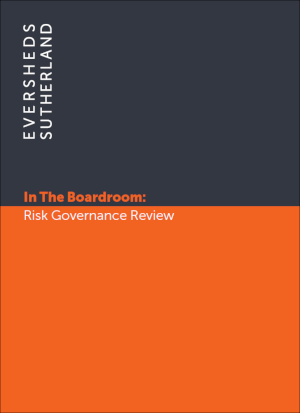Ungated Post | 28 May 2019
In the Boardroom: Risk Governance Review

Corporate board directors are working harder than ever before. New regulations, changing business models, rising shareholder activism, and other emerging risks require rapid responses. At the same time, technological innovation offers many companies a chance at digital transformation, adding urgency to the board’s strategic mandate. What risks are top of mind for directors? How do successful boards stay on top of these risks while remaining agile? And what can all boards do to adopt best–in–class governance practices?
To answer these and other questions, Eversheds Sutherland and Oxford Economics conducted an anonymous survey of 350 board directors worldwide, 91% of them serving at publicly traded companies. In addition, Eversheds Sutherland interviewed 50 executive and non–executive directors on a non–attributable basis.
Our survey and interviews show that most boards are adopting sophisticated risk management practices, even as the risk environment becomes more complicated and the stakes grow higher. As one non–executive director put it, companies must “see risk management as more than a tick–the–box exercise.”
Our Thought Leadership team produces original, evidence-based research made accessible to decision-makers and opinion leaders. Principals for this project included:
Oxford Economics’ team is expert at applying advanced economic tools that provide valuable insights into today’s most pressing business, financial, and policy issues.
To find out more about our capabilities, contact:
EMEA
Paul Donnelly
Email
Americas
Diantha Redd
+1 (646) 503 3052
Email
Asia
Christie Tang
+852 3974 8841
Email
Related Services

Post
The economic impact of abandoning the WTO
Oxford Economics have been commissioned by the International Chamber of Commerce (ICC) to provide an independent assessment of the economic impact of WTO dissolution. This report details our findings and the assumptions underpinning our analysis.
Find Out More
Post
The economic impact of the sports activities of public service media
This study shows how the sports activities of public service media supported €4.5 billion of GDP and 57,000 jobs across 31 European countries in 2022. The report also highlights wider economic benefits of public service media sports coverage, such as the way in which it leverages sponsorship income for sports bodies.
Find Out More
Post
Global Trade Education: The role of private philanthropy
Global trade can amplify economic development and poverty alleviation. Capable leaders are required to put in place enabling conditions for trade, but currently these skills are underprovided in developing countries. For philanthropists, investing in trade leadership talent through graduate-level scholarships is an opportunity to make meaningful contributions that can multiply and sustain global economic development.
Find Out More